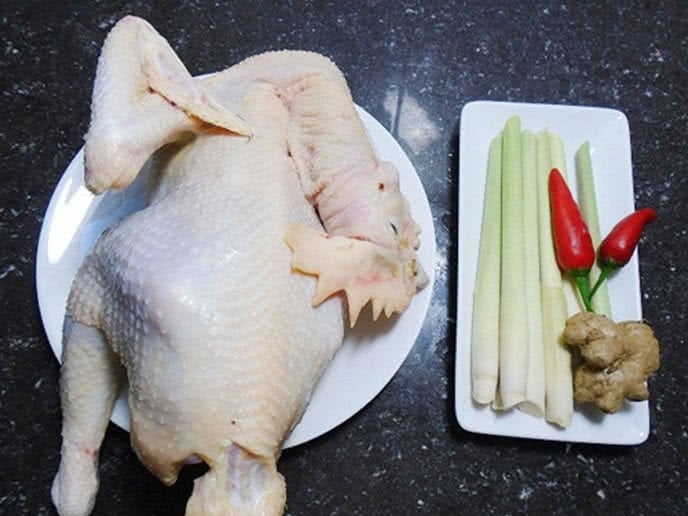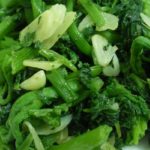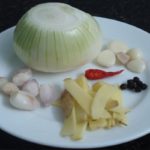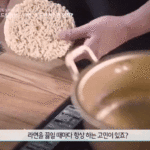Ingredients: One whole chicken, scallions, ginger, cooking wine, salt, and light soy sauce.

Chef’s Tip: How to Boil Chicken to Perfection
Preparation instructions:
Step 1: Start with a fresh or frozen whole chicken. After cleaning and rinsing it, pat the chicken dry. Wash and finely chop the scallions and ginger.
Step 2: Place the chicken in a pot and pour in just enough cooking wine. Rub the wine all over the chicken, then stuff its cavity with some scallions and ginger strips. Sprinkle the remaining chopped scallions and ginger on top of the chicken. Let it marinate for 30 minutes to reduce any fishy smell and enhance the flavor.
Step 3: Turn on the heat and add just enough water to the pot. Once the water boils, carefully place the whole chicken, including its neck, into the pot. Blanch it for 10 seconds, then quickly remove it. Repeat this process two more times.
Step 4: On the third time, leave the chicken in the pot. Add some scallion strips, ginger, salt, and cooking wine to taste, along with a preserved olive to give the chicken a golden color. Simmer on low heat for about 10 minutes, then turn off the heat and let the chicken steep for another 15 minutes. Poke the meat with a chopstick; if no red liquid comes out, it’s cooked.
Step 5: After the chicken is cooked, quickly immerse it in a bowl of iced water for 3 minutes. This process tightens the skin and enhances the flavor. Once cooled, remove it from the water, pat it dry, and chop it into bite-sized pieces. Serve it on a plate with your choice of dipping sauce.
For a perfectly boiled chicken, consider these tips:

Golden-Skinned, Sweet-Meated Boiled Chicken
-
Choose fresh chicken: Opt for free-range or farm-raised chicken for firmer, sweeter meat that doesn’t fall apart easily. Ensure the chicken is fresh and doesn’t have any unpleasant odors or signs of spoilage.
-
Marinate the chicken before boiling: Rub a mixture of salt and crushed ginger all over the chicken and let it sit for 15-20 minutes before boiling. This reduces any fishy smell and adds a delightful aroma.
-
Boil the chicken in cold water: Place the chicken in a pot and cover it with cold water before turning on the heat. This ensures the chicken cooks evenly from the outside in.
-
Don’t cover the pot tightly: Once the water boils, reduce the heat to a gentle simmer. Keep the lid slightly ajar to let the steam escape, preventing the chicken meat from becoming tough.
-
Add flavor to the boiling water: Toss in a few slices of ginger, a whole shallot, and a pinch of salt to the pot. These ingredients enhance the chicken’s flavor and eliminate any fishy smell.
-
Pay attention to cooking time: Depending on the size of the chicken, boiling usually takes 30-40 minutes. To check for doneness, pierce the thickest part of the thigh with a skewer; if the juices run clear, it’s cooked.
-
Immerse the cooked chicken in cold water: As soon as the chicken is cooked, plunge it into cold water for a few minutes. This ensures the skin remains crispy, the meat stays tender, and the chicken doesn’t dry out.
By following these tips, you’ll end up with a delicious boiled chicken that’s tender, flavorful, and free from any fishy taste.
More Useful Advice for Homemakers (Part 2)
Have you heard of the surprisingly easy tips to make cooking and household chores simpler? White radish eliminates the acrid taste of salted meat, adding alum to raw shrimp helps soften it, and adding cold water when frying eggs can make them crispy – these are just a few of the tricks to make your life easier.
Ten Strategies to Streamline Your Cooking Process
Are you a busy housewife looking for ways to save time in the kitchen? Did you know that flossing can also help you out? Check out these 10 tips to help you quickly and easily prepare delicious meals for your family. Learn how to peel garlic in 10 seconds and cut cherry tomatoes quickly for a healthy and tasty meal.



































